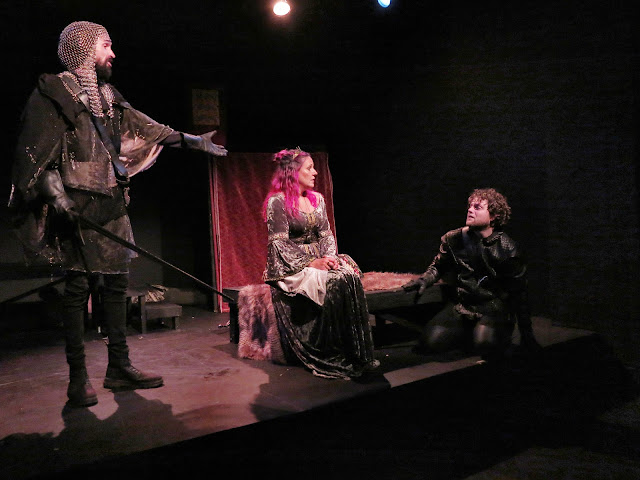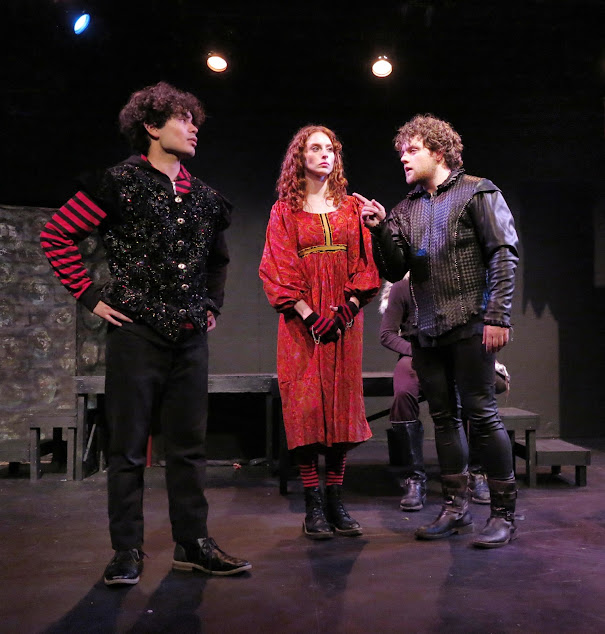Hamlet Speak
Adapted and directed by Kathy Curtiss
312 West 36th Street, 4th floor, Manhattan, NYC
July 26-29, 2023
 |
| Joshua Johnson as Horatio and Austin Zimmerman as Hamlet. Behind: The Players. Photo by Jonathan Slaff. |
If there is a better way to begin a production of
Hamlet than with the music of German band Rammstein, we haven't seen it yet. Rammstein's industrial-infused hard rock plays over projected images and video of war across the ages to begin
Hamlet Speak, a new version of Shakespeare's
Hamlet, freely adapted and directed by Renaissance Now Theatre & Film's Artistic Director Kathy Curtiss, which includes short monologues in a contemporary voice from Hamlet and Ophelia. Curtiss, who took a similar, and similarly successful, approach to the Scottish play in last year's
Macbeth Redux (read our review
here), adds often confessional, sometimes metatheatrical commentary, which, particularly in Hamlet's case, increases the already present sense of the audience members as confidants. Played in rep with a
Midsummer Night's Dream set in the Laurel Canyon music scene (read our review
here),
Hamlet Speak offers both a tragic flip side to
Midsummer's interference by the older generations in the personal and romantic lives of the younger and proof that a production of
Hamlet can still hold welcome surprises.
 |
| Joel Applegate as Polonius and Eden Bostrom as Ophelia. Photo by Jonathan Slaff. |
Here, Hamlet's (an impressive Austin Zimmerman) first words are a monologue considering the terms "rogue" and "peasant slave" that he will speak as part of his lines later in the play and how they relate to him and his seemingly predetermined end. Such considerations are linked to the thematic opening montage through Hamlet's explanation that Fortinbras's looming invasion of Denmark is in fact a bit of propagandistic political spin by Hamlet's uncle, Claudius (Rick Macy), who, as you may know, has murdered Hamlet's father and appropriated his wife (Amanda Williams as an empathetic Gertrude), and his crown. The rule-by-anxiety in which this propaganda participates is shown in the detail of how some of the celebrants at Claudius's coronation party are startled each time by the celebratory cannon fire. One strain of early modern thought saw the family as a microcosm of the court or nation, and this production highlights throughout how personal violence acts as a microcosm of political violence.
 |
| Houston Baker as the Ghost, Amanda Williams as Gertrude, Austin Zimmerman as Hamlet. Photo by Jonathan Slaff. |
Late in the play, Hamlet asks if it is "possible for a man of conscience to do the right thing," and Horatio's (Joshua Johnson) response, "That is the question," implies that this, and not whether or not to commit suicide (and thereby to abdicate ethical choice altogether) is the real question. (Hamlet's remark at one point that he can't conceive of killing kin highlights how the right thing, his socially and spectrally ordained revenge, is the same act as is being revenged.) Relatedly, in an ingenious tweak, the "To be or not to be" soliloquy is partly shared between Hamlet and Horatio, with at least one of the opening lines coming from a book they have with them. Rendering it in part a conversation points again to replication of the personal in the social (and vice versa) and aligns well with the production's grounded presentation of its characters, which is only enhanced by the adaptation's new text. Claudius's prayer scene, meanwhile, to which Hamlet arrives late, is played like a protagonist's soliloquy, like we are perhaps used to "To be or not to be" being done.
 |
Josh Munoz as Guildenstern, Austin Zimmerman as Hamlet, Sonja Hugo as Rosencrantz. Photo by Jonathan Slaff.
|
Macy's Claudius is as compelling when he is plotting as when he is contemplating his own guilty soul. Eden Bostrom and Seven Harrison convey a clear affection between Ophelia and Laertes, and their relationship to their father, a plummy Polonius (Joel Applegate), is nicely encapsulated in how Ophelia can't help but laugh at Polonius's list of sententious advice for his son, except when he concludes with "to thine own self be true" (a sentiment which Hamlet points out is undermined by Polonius's sending someone to spy on his son as soon as Laertes leaves). This Ophelia's madness is predominantly visceral rather than romanticized, and Curtiss cannily adds a further reason for the intensity of Ophelia's reaction to Hamlet's treatment of her. In another artful change, Rosencrantz (Sonja Hugo) and Guildenstern (Joshua Munoz), calling to mind Tweedledum and Tweedledee with the red and black stripes on their costumes, are imagined as now a couple, which provides an interesting additional dynamic to their roles, including in relation to their history with Hamlet - the betrayals and insults, certainly, take on a different edge, especially in the exchange when Hamlet calls Rosencrantz a "sponge." Houston Baker's angry ghost of Old Hamlet balances out Johnson's even-keeled Horatio as influences surrounding the prince. As that prince, Zimmerman is never less than engrossing, bringing an absorbing depth, sensitivity, and responsive sensibility to his Hamlet - a demonstration of his excellent range in juxtaposition to his very different turn as Bottom in
Midsummer.
Infusing humor and heart into a tale of calamity, Renaissance Now's production foregrounds certain subtexts of
Hamlet and introduces new ones that add to and extend its richness. Entertaining and inventive,
Hamlet Speak shows that there is nothing either good or bad but adapting makes it so.
-John R. Ziegler and Leah Richards







Comments
Post a Comment